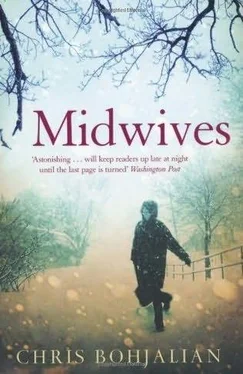Chris Bohjalian - Midwives
Здесь есть возможность читать онлайн «Chris Bohjalian - Midwives» весь текст электронной книги совершенно бесплатно (целиком полную версию без сокращений). В некоторых случаях можно слушать аудио, скачать через торрент в формате fb2 и присутствует краткое содержание. Жанр: Современная проза, на английском языке. Описание произведения, (предисловие) а так же отзывы посетителей доступны на портале библиотеки ЛибКат.
- Название:Midwives
- Автор:
- Жанр:
- Год:неизвестен
- ISBN:нет данных
- Рейтинг книги:5 / 5. Голосов: 1
-
Избранное:Добавить в избранное
- Отзывы:
-
Ваша оценка:
- 100
- 1
- 2
- 3
- 4
- 5
Midwives: краткое содержание, описание и аннотация
Предлагаем к чтению аннотацию, описание, краткое содержание или предисловие (зависит от того, что написал сам автор книги «Midwives»). Если вы не нашли необходимую информацию о книге — напишите в комментариях, мы постараемся отыскать её.
Midwives — читать онлайн бесплатно полную книгу (весь текст) целиком
Ниже представлен текст книги, разбитый по страницам. Система сохранения места последней прочитанной страницы, позволяет с удобством читать онлайн бесплатно книгу «Midwives», без необходимости каждый раз заново искать на чём Вы остановились. Поставьте закладку, и сможете в любой момент перейти на страницу, на которой закончили чтение.
Интервал:
Закладка:
I know there were other reasons as well, but those reasons are more difficult for me to articulate: They begin, on some level, with a desire to be around babies that is so strong it may be genetic, but they go deeper still. A need to know without reservation exactly when someone is alive and when someone is dead. Atonement. A desperate distaste for the whole idea of a C-section, combined with an occupation that will demand I perform the operation with regularity. Reparation. Compensation. Justice.
Some of my mother's midwife friends are aware that I have been writing this book, and they fear now that my recollections will be tinged by my profession. In their eyes, I am not the one who should tell my mother's story, and they want me to leave it alone.
If they knew what I know, if they had seen the notebooks and knew that I had stolen key entries, they would be more than fearful: They would be furious. They would most certainly not want this tale told.
But on the second Wednesday of the trial, my mother's story became my story, too. I know now my mother would want our stories told.
She discovered that someone had folded pages from her notebooks the Monday after the trial was over, just after I had left for school and my father had left for his office. Apparently her first thought was that Judge Dorset had removed them from the binder to read them carefully, and he was the one who had creased them. But the idea that the judge had spent any time at all with those entries and then ruled the notebooks were irrelevant didn't make any sense, it didn't make any sense at all. And so the idea crossed her mind that someone else was responsible, and that someone probably was me.
Midmorning she went to the general store for a newspaper, and her suspicions about me grew more pronounced. Toward the end of a news analysis of the trial, one of the jurors brought up the notebooks.
"We all knew the judge was reading her diary during the recess-that was pretty clear," the juror said. "And so we expected we'd get to hear what she'd written. But then the judge read it and didn't see anything incriminating in it. I can't speak for everyone else, but that mattered a lot to me."
When I returned home from school, my mother confronted me. She said she honestly didn't know whether she should be disappointed in me or proud beyond words. On the one hand, she saw in her daughter a teenage girl who would read someone else's private diaries and then have the audacity to break the law and obstruct justice. On the other hand, she was astonished by my courage and the risk I was willing to take on her behalf. She said she loved me either way, but then asked me a question that revealed yet one more emotion churning inside her:
"What do you think now of what I did?"
I told her I was glad she had saved the baby, but my answer was meaningless. We both understood it was the question that mattered, it was the inquiry that made clear the way our lives as mother and daughter were forever changed: I was fourteen years old, and I knew my mother's worst fear.
Before my father came home, my mother actually suggested that I should go forward and confess what I had done. I was a minor; the penalty couldn't be too severe, she said. Reform school, perhaps. She wasn't serious-just as I did everything I could to protect her, as my mother she would do everything she could to protect me-but for a few hours I hid in my room like a scared kitten, convinced that my mother was willing to destroy us both in a policy of familial scorched earth.
And yet she never even told my father what I had done. When she came to get me for dinner, she told me we would never again speak of what had become our crime.
And until she was diagnosed with lung cancer two years ago, we never did. It wasn't until her third afternoon of chemotherapy-one of the days that I drove her to the oncologist in Hanover, New Hampshire, and kept her company while the poisons were dripped intravenously into her arm-that she brought up the name of Charlotte Bedford.
"Is she why you're becoming a doctor?" my mother asked. "Or am I?"
"Both, I guess."
She nodded, and watched the clear tube where it merged with a needle and then her skin.
"I haven't opened my notebooks in years. I boxed them up when you went away to college. You probably knew that, didn't you?"
I rolled my eyes. "I guess I did."
Not long after she paid her fine, my mother returned to midwifery. She lasted almost a year, and for a time her life was filled with activity, if not exactly joy. There were the prenatals and the consultations, the women-sometimes women and men-coming and going at our house. It was clear to us all that she would be able to rebuild her practice.
But then her new clients started coming to term, and she had to start catching babies again. She discovered during her first delivery that the almost bewitching pleasure that birth had once held for her had been replaced by fear. Every time she encouraged a woman to push, she thought of Charlotte; every time she placed a warm hand on a laboring woman's belly, she was reminded of the imaginary line she'd once drawn with her fingernail from Charlotte's navel to her pubic bone.
And so she stopped. She delivered her last baby on a sunny afternoon in early November, after a labor that was intense but short, and largely uneventful. She was home in time for supper, and my father, my mother, and I ate dinner together. We knew it was the last birth, and my father toasted my mother and all of the beauty she'd brought into the world.
For a short while a rumor circulated in Vermont that my mother had left the profession she loved because of some agreement with Asa Bedford. The rumor implied that neither he nor the Fugetts would press a wrongful death civil suit against my mother if she agreed to give up midwifery, but there was no such agreement.
Asa decided against a civil suit almost immediately because-as he was quoted as saying in one article-he was "not interested in knowing the monetary value of my Charlotte's life." Besides, Asa was a good man and he was a minister: He knew as well as anyone to whom revenge really belongs.
Nevertheless, my mother never did catch another baby after that final November birth. Exactly as she had told her own mother she would, she pulled down those prenatal posters and covered the walls of what had once been her office with blue iris paper. She then read in that room and she quilted in that room, and I'm sure when the house was quiet she sat alone in that room and stared at the mountains in the distance. For a few more years she kept writing in her diary in that room.
And then, suddenly, she boxed up the binders and carried them up to the attic. I came home from college the Christmas of my freshman year, and I looked in on her study and saw the notebooks were gone, the shelves filled now with gardening books and decorating magazines.
"Do you know where I put the notebooks?" my mother asked me as the toxins dripped into her arm.
"The attic, right?"
"Right. They're yours if you want them. When the time comes."
I tried to laugh: "Mother, don't be morbid." But as a doctor and an emeritus midwife, we had both done our homework on her cancer, and while we had never verbalized the statistics aloud, we knew the prognosis was bleak. Her particular form of lung cancer was deadly. She had some chance for a brief remission, but virtually no chance of recovery.
"I didn't say the time is coming tomorrow. But I want you to know they're yours. Do with them as you will."
She was told she was in remission a mere four and a half months after her diagnosis, but the remission lasted barely a season, and she died five months after the cancer returned.
Of the men in my life the year I turned fourteen, it is only my father I continue to see regularly. And I have always been blessed to see him a great deal. He still lives in Reddington, and I've joined a practice in central Vermont, and so we've been able to have lunch or dinner at least once a week since my mother died. He no longer works: When my mother was diagnosed with cancer, he sold his part of what had become a fifteen-person firm.
Читать дальшеИнтервал:
Закладка:
Похожие книги на «Midwives»
Представляем Вашему вниманию похожие книги на «Midwives» списком для выбора. Мы отобрали схожую по названию и смыслу литературу в надежде предоставить читателям больше вариантов отыскать новые, интересные, ещё непрочитанные произведения.
Обсуждение, отзывы о книге «Midwives» и просто собственные мнения читателей. Оставьте ваши комментарии, напишите, что Вы думаете о произведении, его смысле или главных героях. Укажите что конкретно понравилось, а что нет, и почему Вы так считаете.











